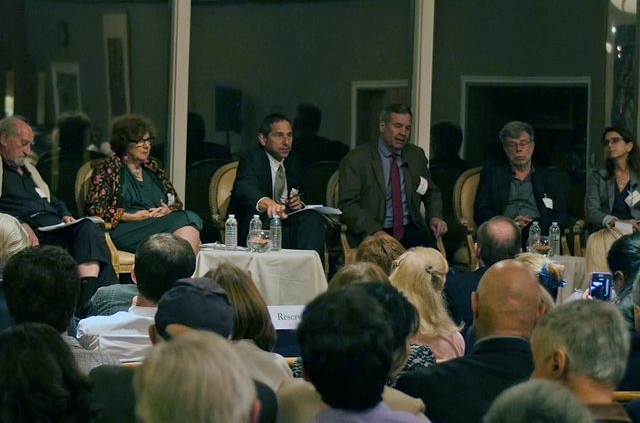Why History Matters panel analyzes presidential election with with eye toward the past
After a fractious day of election media coverage, a packed crowd gathered at the UCLA Faculty Center Thursday night to dissect the presidential race through the lens of the past as part of “Why History Matters,” a series from the UCLA history department.Stephen Aron, chair of the department; Ivan Berend, distinguished professor of history at UCLA; and Ellen Carol DuBois, distinguished professor of history and women’s studies, were joined by Lisa Mascaro, Washington, D.C.-based congressional reporter for the Los Angeles Times; Paul Maslin, a leading campaign strategist who worked with presidential candidate Howard Dean in 2004; and Bill Carrick, a consultant for candidates in California and nationwide.The panelists tackled the conditions that allow for the rise of demagogues, the media’s complicity in Donald Trump’s candidacy and the expected and unexpected gender dynamics that have emerged as one of the most hyper-masculine candidates ever to run competes with Hillary Clinton, the first female major-party candidate for president.They also expressed grave concerns about the potentially irreparable rifts both within the Republican Party, and the country at large.“The wasteland left behind from this political campaign is enormous,” said Maslin, who noted that regardless of the outcome on Nov. 8 most every American group — private, corporate or political will walk away with some level of disappointment and trauma.DuBois agreed the tension is palpable, comparing this year to the pervasive public anxiety around the fraught primaries and campaigns that led to the election of Abraham Lincoln in 1860.But, DuBois also admitted that as a long-running feminist and expert on the history of women’s suffrage, she would find plenty of reason to celebrate the election of the first woman president almost 100 years after the 19th amendment was ratified. On the topic of gender discourse, panelists contemplated how the “Access Hollywood” footage of Trump talking lewdly about women seemed to be the bridge too far for some voters and party leaders.“I think that these events have brought out the hidden totality of how much low-level, casual sexual harassment is the experience of women in this society,” DuBois said.Mascaro shared her observations of those who will stand by Trump to the end, no matter how bitter. Tasked to report on the Republican sphere of the election for the Los Angeles Times, Mascaro attended many Trump rallies during the primaries. She’s not surprised at the turmoil within the GOP.“There is this great sadness out there in this country, this great feeling of being left behind, for a large portion of the people who back Mr. Trump,” she said. “When you hear their stories you hear about the way they feel culture is leaving them behind, the economy is leaving them behind. We’re experiencing a real churn in this country with what is happening in our economy and our diversity, and a lot of people don’t feel like they are a part of that.”Berend, who survived the Dachau concentration camp during World War II, brought both personal and professional perspective on demagogues of the past. His upcoming book traces the history of European demagogues. He noted that times of great change, even positive ones for society at large, can often serve as fertile ground for fear-mongering politicians.“Demagogues give very simple solutions to complex problems … and they always name the enemy, both things Donald Trump does very well,” said Berend, who was born in Hungary in 1930.A demagogue needs a pulpit, and according to Carrick, the media’s own survival instinct provided that.The media’s appetite for ratings and eyeballs driven by crisis-level business models, along with Trump’s cachet and celebrity that predated his presidential run, allowed media outlets to give him special leeway and opportunities for coverage, Carrick said.Mascaro agreed that the changes in how media is shared and consumed has contributed to current polarization, both that of voters and media outlets themselves.“We’ve shrunk into self-segregating, self-reinforcing ideology,” she said.There are still reporters out in the field, she noted, asking questions, listening and reporting back. She urged the audience and fellow panelists to try and read news coverage from and about differing points of view.“Put yourselves in the shoes of these other people and get a sense of all walks of life,” Mascaro said. “It’s both frustrating and heartening because … what’s important to people, there’s so much common ground. People constantly talk about their hopes and dreams in ways that are so similar even though they come from extremely polarized political points of view.”


